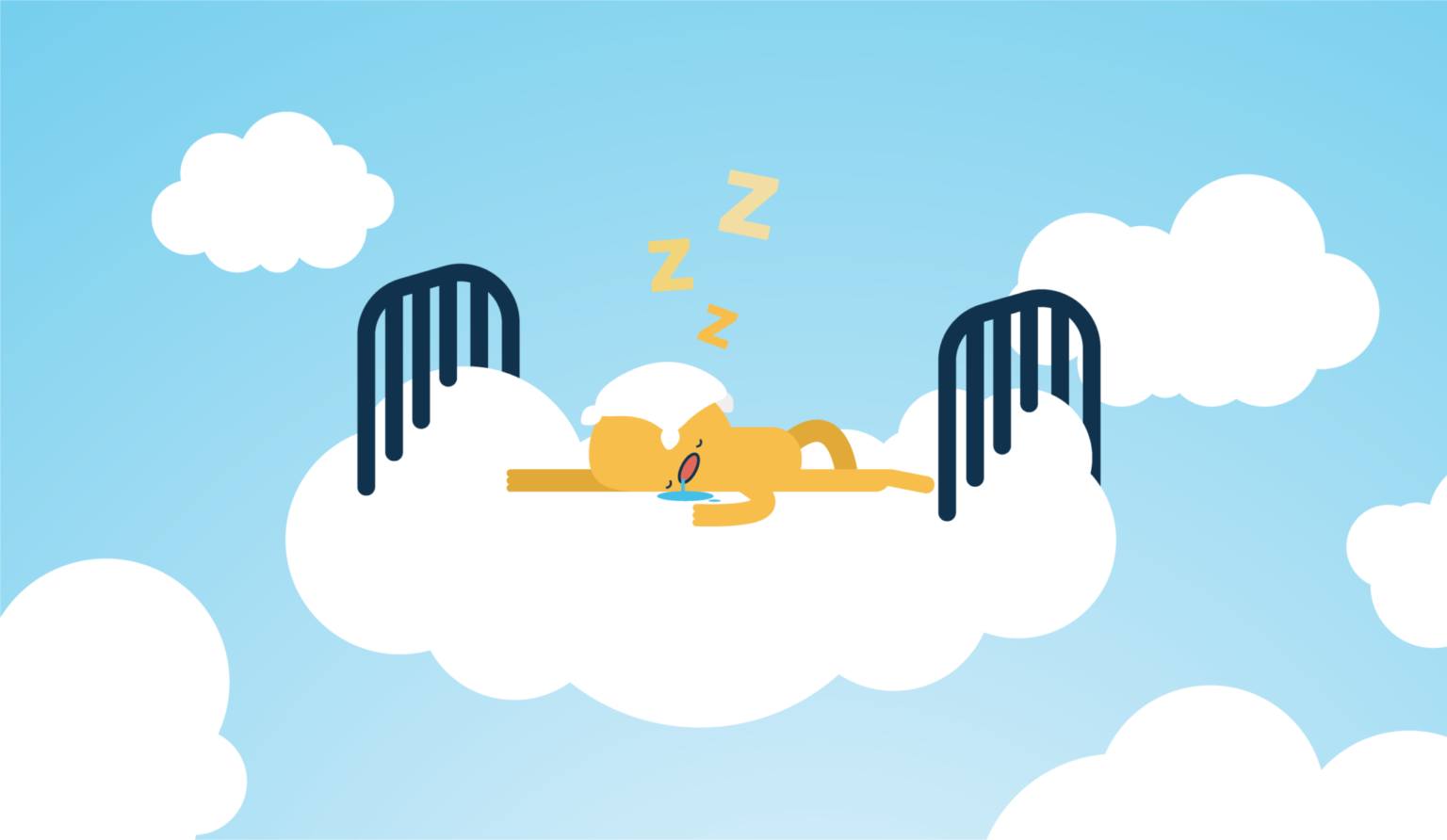Deep Sleep – Meaning and Sleep Stages
Which cup of coffee are you on today? As I’m writing this, I’m only on my second, although I might brew a placebo coffee later (that’s when you make a cuppa and you don’t drink it because suddenly you don’t need it anymore). What does that tell you about my sleep schedule? Actually, nothing; it just tells you I have a mild coffee problem. Still, missing out on your deep sleep phase may have you reaching for excessive coffee or lots of processed sugar – neither of which is that great for you.
So, what is deep sleep?
Deep sleep is the third phase of non-REM sleep (rapid eye movement). And if that doesn’t throw the spanner in the organisational works, then nothing will, so let’s revise the sleep stages.
What Is Non-REM Sleep?
During this phase, your eyes are still relatively peaceful as your body relaxes. There are four stages of non-REM sleep:
- The first stage is short (only a couple of minutes) as you slowly transition from wakefulness to sleep.
- This is followed by a longer phase during which your heartbeat slows down, muscles relax, and your eye movement stops.
- The deep sleep stage spans phases 3 and 4 of non-REM sleep, and it lasts between 45 and 90 minutes in the third stage and is shorter in the fourth. During the deep sleep phase, there is no eye movement, the heart rate is at its slowest, and the muscles are fully relaxed. Due to the low speed of brainwaves at this point, it becomes difficult to wake up even with loud noises.
REM Sleep
Rapid eye movement, as its name points out, is the stage during which the body starts ramping up its functions: your eyes move from left to right, you experience dreams because the brain activity increases again, and the heart rate goes up as the body prepares to wake up.
You get the most rest during your deep sleep stages, although REM may be more exciting with all the nonsense your brain tends to mash together!

The Unignorable Importance of Deep Sleep
I’m not gonna lie; science is more interested in REM phases of sleep because it’s still relatively unknown why and how dreams happen and whether they symbolise something. Leaving Mr Freud aside for a moment, it’s safe to assume that dreams have a meaning, but it’s hardly the one psychoanalysts and esoteric practitioners have in mind. No, dreaming about a cake does not mean you’ll die in poverty. However, dreaming about teeth may very well mean worrying because once you have a silly dream like that, you can’t not check your teeth?! God bless nightmares.
Dreams aside, the benefits of deep sleep include:
- Rest. Most of it happens during this stage as the body doesn’t move, and the brain gets a break it craves during the day.
- Physical repair. During deep sleep, your body releases growth hormones, which contribute to muscle repair, recovery, and relaxation. If you do high-intensity sports or have a tough job, it’s imperative to maximise your deep sleep.
- Memory pathways cleared. Throughout the day, you receive a lot of input. Although it may not always seem so, everything you see and hear is noted somewhere. The problem? The brain can’t do this forever. Instead, during deep sleep, it consolidates important memories and discards superfluous ones. How does the brain know this? Well, it’s smart! Jokes aside, the human brain remains the biggest mystery to this day, and we may never get all the answers we need.
- Boosting the immune system. The body cannot function properly when worn out; the same applies to your defence against viruses and bacteria. You know how you tend to get sick after a time of being overworked – well, there it is, all the more reason to ditch the hustle culture and introduce more balance.
- Disease prevention. Getting enough deep sleep gets harder as you age, and it’s sometimes associated with Alzheimer’s disease as well as various heart conditions. Yikes! Gotta get into those good habits ASAP!
Can You Increase Deep Sleep?
With all its benefits, it’s clear you should aim to get enough quality sleep every night. Drop the whole ‘I haven’t slept for weeks’ attitude and develop a set of healthy habits to improve your deep sleep phase. Note the word improve here. In theory, adults don’t need as much deep sleep as children because our bodies are fully developed and don’t incite growth anymore. However, if you engage in heavy training sessions, your body needs that repair time. On the other hand, if you’re preparing for exams and have spent the whole day studying, your brain needs to work through all that information too.
Ultimately, it’s always a good idea to optimise your deep sleep stage. The question is, of course, if it’s even possible to increase it if we’ve already established it lasts between 45 and 90 minutes. The answer lies in another question – are you getting those 90 minutes at all? You need to create a good sleep routine to maximise your deep sleep and wake up refreshed. So, sure, parties and an occasional game night are fine, but you shouldn’t do it every day.
6 Foolproof Deep Sleep Hacks
To ensure you’re getting the most of your deep sleep stage, follow these foolproof tips for boosting your sleep quality:
- Establish a firm bedtime. You should aim to be in bed between 10 and 11 in the evening. Force your body into a habit. At first, it may be difficult, but as you get used to it, you’ll find yourself falling asleep just fine.
- No coffee (or other drugs) at least 6–7 hours before bed. Stopping in the early afternoon allows you to flush out all the caffeine by the time you hit the sheets. Ideally, you’ll ditch any alcohol and cigarettes too.
- Get enough exercise. Around 30 minutes of daily activity is enough to feel the difference. Of course, developing a good fitness habit wards off many diseases, keeps you in good shape, and boosts your mood, so more sleep is just a bonus.
- Spend some time outside. Direct sun exposure helps you maintain a natural sleep schedule. You should also keep the shutters open so you wake up with the morning light rather than fully disoriented in a dark room.
- The bedroom is for sleeping. Don’t spend too much time in the bedroom during the day, as your brain may form associations of non-sleep-related activity, which can make it harder to fall asleep. If you live in a dorm and your room is simultaneously your bedroom, avoid studying and eating in bed for the same reason.
- Develop a relaxing bedtime routine. What you do in the hours before bed determines how well you’ll sleep. Go for a walk, read a book, or do some yoga. Under no circumstances should you turn the hour before bed into a relentless cardio session. Aim for relaxation, not increased activity.
There is an argument that you should not eat several hours before bed as the body needs to relax rather than spend the night digesting. You can achieve this by eating enough throughout the day and getting enough protein. However, if you’re hungry, don’t hesitate to get a snack!
How about Deep Sleep Meditation?
Overall, meditation is a good practice to help you calm an excited mind, hyperactive emotions, and wild thoughts. It helps you feel grounded, makes you appreciate your surroundings, and teaches you gratitude. Meditating before going to bed can boost your deep sleep.
For all you professional meditators, you probably don’t need any advice from me, but beginners may find themselves at odds about how to start and maintain the habit. I heartily recommend following professionally guided sleep meditations or treating yourself to the Headspace app!
Deep Sleep Music – Is There Such a Thing?
If you’re not a fan of someone talking you into sleep, you may be tempted to listen to some music as you doze off. But is Rammstein really the best thing to listen to before bed? Didn’t think so!
Neuroscientists have made some advances in this direction, discovering that the best way to boost your deep sleep is to listen to the so-called pink noise. Pink noise is a series of alternating high and low frequencies that correspond to the slowing brainwaves of the deep sleep stage. In doing so, pink noise promotes memorisation, relaxation, and recovery.
Pink noise sounds a bit like rainfall or water rushing, both of which are known to promote good sleep. The switch between frequencies allows the brain to notice the sound without being disturbed. You can leave it on speakers as you fall asleep and test how you feel as your body adjusts to the change. There are various pink noise compilations lasting between 30 minutes and 10 hours – play around with it to find out what works for you.

Meeting the Amount of Deep Sleep Needed
To recap, deep sleep spans stages 3 and 4 of non-REM sleep, which is when your body relaxes the most to get the rest it needs. Without getting quality deep sleep, bodies become susceptible to several illnesses, fatigue, poor concentration, and an inability to remember things.
To boost your deep sleep, work on developing these habits:
- Getting enough exercise.
- Spending some time outside.
- Creating a relaxing bedtime routine.
- Practising bedtime meditation.
- Avoiding caffeine, alcohol, and nicotine before bed.
With Zhat Zsaid … ah, I’m Zstarting to doZzZe off now. Improve your deep sleep to increase yawn quality of life. Did I say yawn? I meant your quality of life.
Good night!












